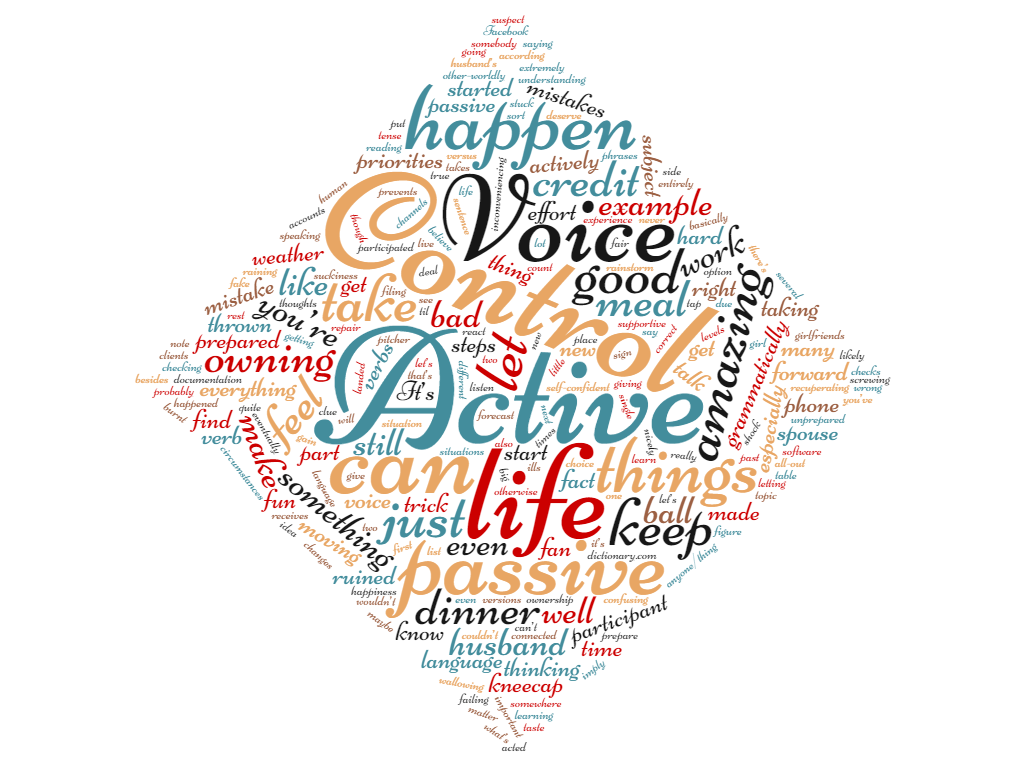Do you live life or does life happen to you? I suspect that if you are actively living life you are having a lot more fun than those who let life happen. And for those of us who let life happen – even just some of the time – how can we tap into that fun of the folks who are all-out all the time? Well, a good place to start is with how we talk about things.
What Brought This Up?
Somebody posted something somewhere and it eventually landed in my Facebook feed. It appealed to me on many levels.
 The first thing that occurred to me was that my single girlfriends needed to see this. Who wouldn’t want to date the girl who is so amazing and self-confident that so many just couldn’t keep up?
The first thing that occurred to me was that my single girlfriends needed to see this. Who wouldn’t want to date the girl who is so amazing and self-confident that so many just couldn’t keep up?
Then I started to look at what really makes these two versions of the same thing so different.
Control. It’s all about having control.
So, how do you take control of a situation, especially if you feel extremely out of control? Change how you talk about it.
Take control through your language. Own your life, good and bad.
New example:
“My dinner was ruined.”
“I burnt dinner beyond repair.”
Either way, I need a new idea for dinner. My point is that if you messed up, own it. Then, when you knock it out of the park, own that too: “Our meal was nicely prepared” versus “I prepared an amazing dinner.”
When you have control, you can make more good things happen and you can correct what went wrong when something bad happens.
True, there are times when bad things happen to you even if you do everything right. You can still control how you respond. Let’s say someone mugs me. I can shut down in shock, or I can get on a phone and start freezing accounts while filing a police report. How I react to this experience is how I take control of it.
Taking Control with Language
As a fan of small steps, let me share with you one of those steps that helps me take and keep control of my life. I work in the active voice. Even when I don’t have control – like when my husband broke his kneecap – I keep myself an active participant in my life.
While my husband was recuperating, I changed my priorities and put off several clients. I didn’t blame my husband for screwing up my calendar, I owned my change in priorities and let people know. Everyone was very understanding and supportive, even though I was inconveniencing them.
When you work in the active voice, those things that you can’t control still happen; however, how you feel about them changes. (Have no doubt, my husband’s broken kneecap truly sucked; I just kept owning it. I actively participated in the suckiness until we worked through it.)
What Is Active Voice?
OK, let’s get into the nitty and the gritty.
How do you know if your working in the active or passive voice? According to dictionary.com, the passive voice is:
“when the subject of the sentence is acted on by the verb. For example, in ‘The ball was thrown by the pitcher,’ the ball (the subject) receives the action of the verb, and was thrown is in the passive voice.”
Do you find that as confusing as I do? Well, it’s basically what I’ve been saying, in the passive voice, life happened to the ball.
Here’s a trick: count your verbs. Two past tense verbs (was ruined) is a good clue that you’re being passive. I’m also a big fan of Word’s Passive Voice checking option in the Grammar check.
When you’re reading something, do you feel connected to the topic? Or, does everything feel sort of other-worldly? That’s a sign of passive voice. A fair amount of software documentation is in the passive voice – maybe that’s part of why it can be so hard to figure out.
OK, so what about in speaking and thinking? Well, that takes a little more effort.

Listen to yourself. No matter what, how you deal with your circumstances is entirely up to you. Are you owning what’s going on in your life? Or, are you letting life happen to you, blaming your ills on anyone/thing other than yourself? Did you prepare an amazing meal, or did an amazing meal just show up on your table? (Side note, part of the active voice is giving credit where credit is due. If your spouse made an amazing meal, they deserve the credit. You can take credit for having such good taste in your choice of spouse.)
Actively Passive
You can be grammatically active and still be taking a passive role. This is especially important in your thinking. (Besides, who grammar checks their thoughts?)
Next new example: you are unprepared in a rainstorm. “It just started raining on me!” is not taking ownership. It’s hard to believe that you could not have found a weather forecast with just a touch of effort – not when there are 24/7 weather channels and phone apps.
Then there’s owning your mistake and getting stuck on the fact that you made a mistake. It is OK to be human and make mistakes, the trick is to GET OVER IT. Wallowing in the fact prevents you from learning, moving on, and owning the rest of your life.
Be Active, Get Happy
There are a couple of phrases you’ve probably heard: “Fake it ‘til you make it” and “Failing forward.” Both imply that if you just keep moving forward, learn from your mistakes, and keep the right mindset, things will work out. I’d like to add “Be Active, Get Happy” to that list.
By being an active participant in your life, grammatically and otherwise, you can take control of your situations and gain happiness. If you just let life happen to you, you give up control and you’re likely to find that things are never quite as you would like them.
-Lorrie Nicoles
